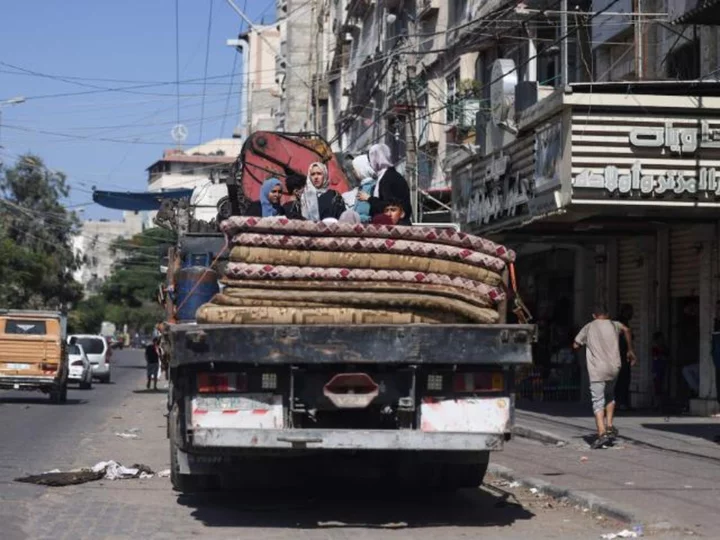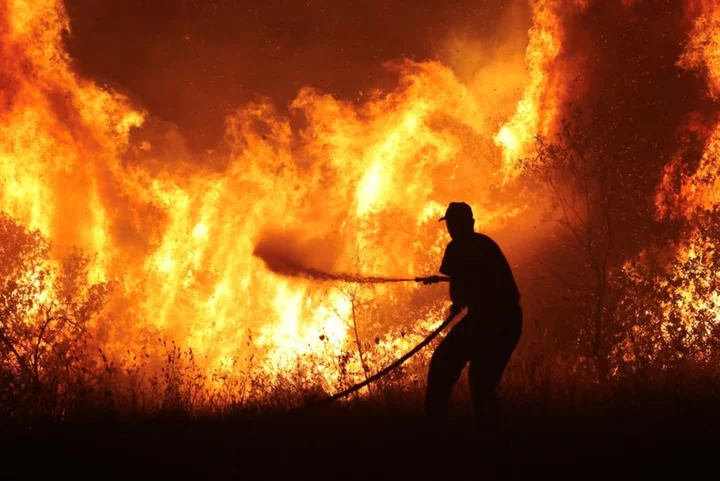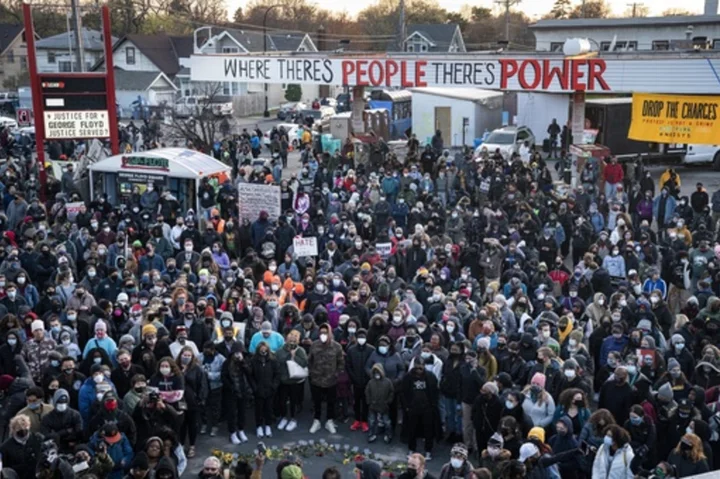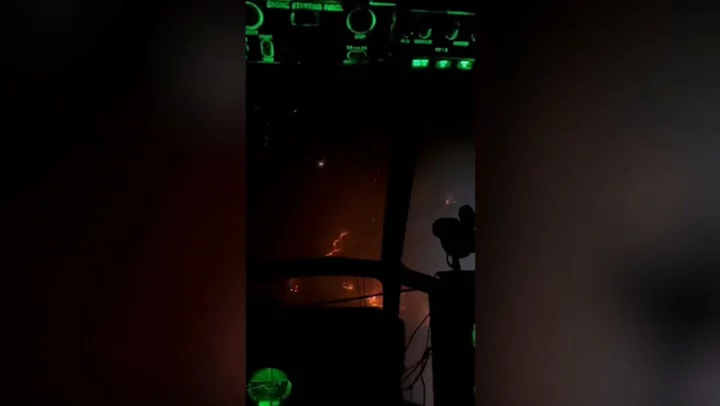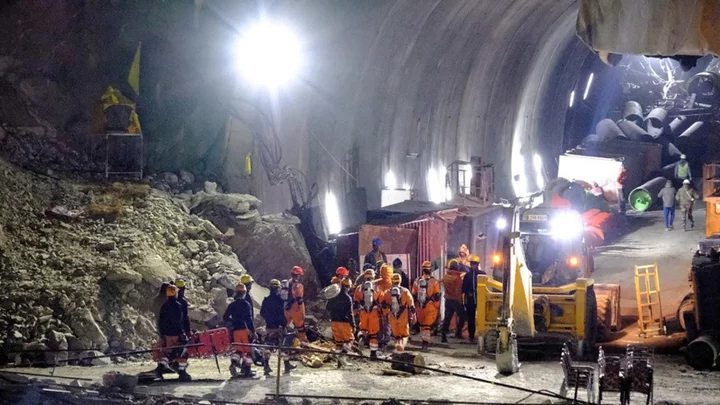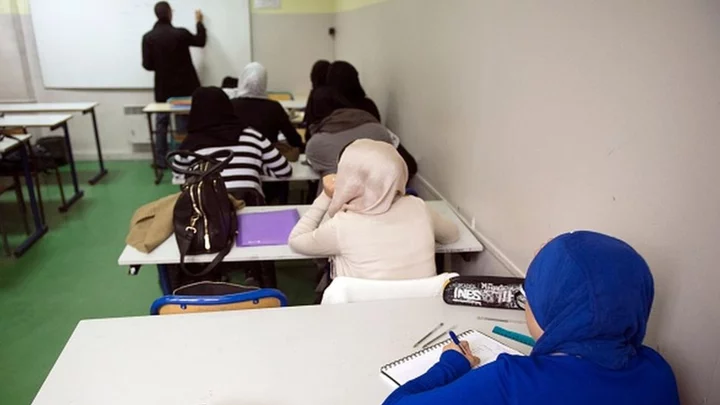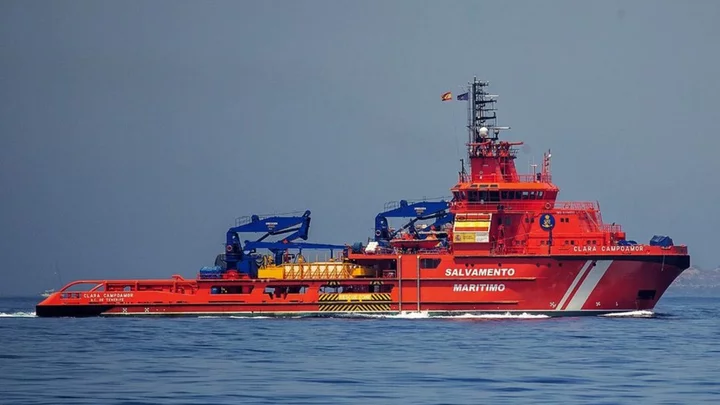Tens of thousands of people in Gaza have fled their homes after Israel's military issued a stark evacuation order Friday, according to the United Nation's humanitarian body, prompting international alarm as Israeli troops gather by the border and as conditions worsen inside the bombarded strip.
Even before the warning, more than 400,000 Palestinians had already been internally displaced by the past week of fighting and relentless Israeli airstrikes, according to a statement by the UN Office for the Coordination of Humanitarian Affairs (OCHA) on Saturday.
But numbers have grown since the Israel Defense Forces (IDF) warned more than 1 million people in northern Gaza to leave their homes immediately, ahead of a possible ground assault in response to the October 7 attacks by Islamist militant group Hamas.
Images from Gaza, which is controlled by Hamas, show a mass rush toward the south of the coastal enclave on Friday. Civilians crammed into cars, taxis, pickup trucks and even donkey-pulled carts; roads were filled with snaking lines of vehicles strapped with suitcases and mattresses.
Those without other options walked, carrying what they could. Some have stayed put regardless, telling CNN they felt nowhere was safe.
Saturday morning marked one week since Hamas' unprecedented and bloody attack on Israel, which killed more than 1,300 people and led to the capture of civilian and military hostages now believed to be held in Gaza.
The surprise attack, widely described as Israel's 9/11, saw waves of heavily armed Hamas fighters rampage through rural Israeli towns, kibbutzim and army bases.
In response, Israel ordered a "complete siege" of Gaza, including blocking food, water and fuel, while mounting its heaviest ever airstrikes on the enclave.
International observers warn the cutoff will see Gaza civilians die by starvation, disease and lack of medical care for the growing numbers of dying and wounded.
At least 1,900 Palestinians have been killed in Gaza from Israeli strikes, according to the Palestinian Ministry of Health. That toll includes 614 children.
Israel has been massing hundreds of thousands of troops and military equipment at the border while it ramps up its siege of Gaza. However, it's not clear what kind of operation the IDF is preparing for, or when it may take place.
UN officials were initially told by Israel on Thursday the relocation of Gaza residents should happen within 24 hours. But Israel has since acknowledged that the mass migration order will take time, and IDF spokesman Lt. Col. Peter Lerner said Friday that any deadline "may slip," adding to the uncertainty swirling.
Another IDF spokesperson, Lt. Col. Jonathan Conricus, claimed on Saturday that Hamas was trying to stop Palestinian civilians from evacuating "via messages and also checkpoints and stops on the ground," citing media reports.
When asked by CNN whether the evacuation order suggested an impending ground incursion, Conricus said the IDF would "assess the situation on the ground" and "see how many civilians are left in the area ... Once we see that the situation will be permissible for significant combat operations, then they will commence."
The IDF's order has raised international alarm and sharp criticism from some rights groups, especially as critical supplies run out and deaths rise in the isolated enclave, from which residents say they have no escape.
"The order to evacuate 1.1 million people from northern Gaza defies the rules of war and basic humanity," wrote OCHA head Martin Griffiths in a statement late Friday. "Roads and homes (in Gaza) have been reduced to rubble. There is nowhere safe to go."
"Forcing scared and traumatized civilians, including women and children, to move from one densely populated area to another, without even a pause in the fighting and without humanitarian support, is dangerous and outrageous," he added, warning it would bring "catastrophic humanitarian consequences."
More than 2 million Palestinians -- including over a million children -- live in the 140-square-mile Gaza Strip, one of the most densely populated places on Earth.
The territory has been under a land, sea and air blockade enforced by Israel since 2007, with more than half its residents living under the poverty line even before the latest conflict. Now there's only one corridor left for Palestinians to flee or for aid to enter, connecting Gaza to Egypt -- and it's not clear if that's even operational.
Meanwhile, the World Food Programme said it distributed food to 135,000 people in shelters across Gaza on Friday, but warned "humanitarian supplies are running low."
OCHA added that most people now have no access to water in the strip. "As a last resort, people are consuming brackish water from agricultural wells, triggering serious concerns about the spread of waterborne diseases," it said.
In response, Israel's ambassador to the UN said on Friday the government is doing "all that we can to minimize civilian casualties" by issuing the evacuation order, and accused the UN of not wanting Israel to "defend itself."

